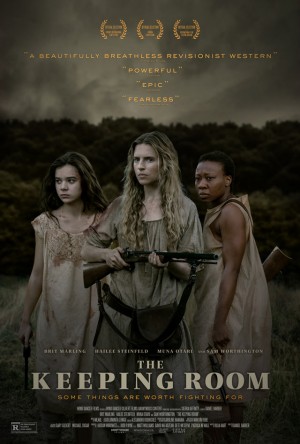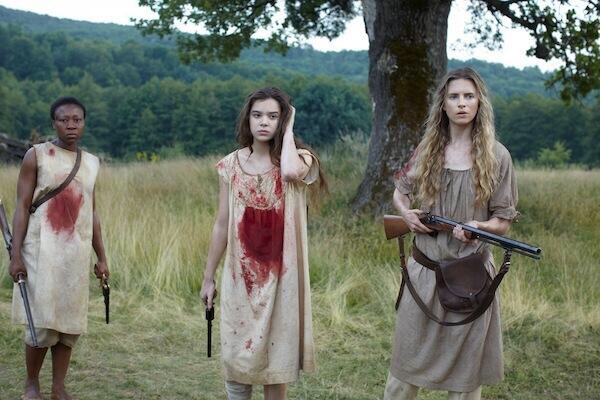The Keeping Room, opening today in Kansas City, is a slasher film disguised as a period drama. It takes place during the Civil War, in which two white sisters, Augusta (Brit Marling) and Louise (Hailee Steinfeld), and their female slave Mad (Muna Otaru) must fend off an attack by two fiendish Union soldiers (Sam Worthington and Kyle Soller) who leave a pillaged, bloody trail behind them as they cut through South Carolina ahead of Union general William Sherman.
When Louise is bitten by a racoon while inexplicably wandering through the woods near their farm house, which they take care of after the two girls’ father and brother are sent off to fight for the Confederacy, Augusta must venture into a town miles away to find medicine, where Union soldiers Moses (Worthington) and Henry (Soller), sulking drunkenly in a saloon, discover her and immediately sniff her out as their next victim, half an hour after the opening scene, in which Moses shot and killed a woman after sexually assaulting her.
After plodding through the film’s naturalist, lyrical visual style, we are presented with a situation in which the two sisters and Mad are trapped in their isolated farmhouse and are under siege by both Henry and Moses as they prey upon the three women like menacing, lurching monsters, in a similar manner derivative of George A. Romero’s Night of the Living Dead, and the Home Alone movies. The film’s dreamy images and airy musical score are in complete, jarring contrast to the Home Invasion plot scheme that kicks in two-thirds of the way through the film.
Director Daniel Barber is nearly an expert at giving a sense of time and place to the mid 1860s rural South Carolina setting. Natural lighting, the outside world, the farmland setting, and the sisters’ and their slave’s seemingly languid way of living are all passively observed in certain parts of The Keeping Room, halting the pacing of the film as it slowly builds to the attack on the sisters’ homestead near the third act. But the encroachment upon the sisters’ home approaches so arduously that the Union soldiers’ attack doesn’t come off so much as a surprise that shakes the sisters and Mad from their languorous way of living, but as an incongruous plot element stripped from a Friday the 13th or Halloween sequel and rudely imposed onto a slow-moving, straight-laced costume period drama. The two Union soldiers lurch menacingly around the sisters’ house under the cover of night in order to rape and murder them, like a mixture of Romero’s zombies and numerous masked slashers from admittedly far worse movies. The film’s pseudo-serious artiness is choked by its strange urge to devolve and reshape its lyrical, loose plot structure into the template of slasher genre dreck.
Don’t let the dynamic between the two white sisters and their black female slave, in which all three women band together to fight off their attackers, fool you into thinking that The Keeping Room is told through a progressive lens that places Mad on an equal footing. In one scene, where Louise bemoans the workload they must undertake while their father is off fighting, she complains of having to work alongside Mad and calls her the N-word, to which Augustine replies, referring to the sacrifices they’ve all had to make while their father is at war, “Like I told you, Louise, we’re all n–ers now.” In Night of the Living Dead, the apocalyptic onslaught of the living dead encroaching upon an isolated farm house is infused with sharp social criticism about then-current racial segregation in America. Duane Jones, the African American star of Living Dead, played the leading role in that film like a man fighting against the very society that subjugates him. Director Barber uses new-comer Otaru in a condescending way that takes Mad out of any correct historical context that would be truthful and humanistic.
The film reduces race relations, the Civil War, and the roles of women during this time, to the boring cliches of a slasher film. On the other hand, Romero had the foresight to use the horror genre, and the now-familiar Home Invasion plot, to comment on the real life horrors of racism during his time and place. Watch Night of the Living Dead, instead.









Comments on this entry are closed.